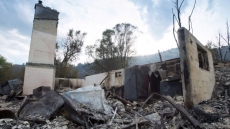TORONTO — The Canadian Red Cross says people from across the country have come together to show their support and compassion for Fort McMurray, donating $30 million for the relief effort in the northern Alberta community.
Canadian Red Cross President Conrad Sauve says that just on Thursday, more than 100,000 people texted his organization to donate.
Calling it an unprecedented "Canadian moment," Sauve says the Red Cross is working with Alberta and Ottawa to ensure that those in need will receive help.
Sauve says that to date, the Red Cross has registered 14,000 families that need help and volunteers are reaching out to others who require assistance.
He says that while the Canadian Red Cross is working to meet the emergency needs in the devastated community, it is also working with the local authorities to make sure they continue to play an important role during the long-term recovery.
Both the federal and Alberta governments have promised to match all donations to the Red Cross for the relief efforts in Fort McMurray.
ALBERTA GOVERNMENT TO PROVIDE CASH TO EVACUEES FOR IMMEDIATE NEEDS

FORT MCMURRAY, Alta. — The Alberta government is providing cash to 80,000 evacuees from the Fort McMurray fire to help them with their immediate needs.
Premier Rachel Notley says cabinet has approved a payment of $1,250 per adult and $500 per dependent at a cost to the province of $100 million.
She told a morning briefing in Edmonton that she wants people who were forced from their homes to know that the government "has their back."
She also said efforts continue to move evacuees stranded at oilfield camps north of Fort McMurray by the fire that has grown to 1,000 square kilometres.
The plan is to airlift another 5,500 today and to move about 500 vehicles in a convoy through the devastated city and south from there.
About 7,000 people were flown out of the camps on Thursday.
TRUDEAU COMMITS TO HELPING FORT MCMURRAY RESIDENTS NOW AND IN YEARS TO COME

TORONTO — Prime Minister Justin Trudeau says he is looking forward to visiting the northern Alberta community of Fort McMurray where a raging wildfire has forced tens of thousands to leave their homes.
He says the visit will have to wait for several weeks because it is not "particularly helpful" for a prime minister to show up while firefighters are busy trying to contain the fire.
Trudeau says the best thing he can do right now is make sure that the Alberta government and emergency authorities receive everything that they need to deal with the situation.
He says the federal government has already met all of Alberta's requests for assistance, including providing air assets and 7,000 cots for evacuees in emergency shelters, with 13,000 more on the way.
Trudeau says Fort McMurray has for years contributed considerably to Canada's economic growth, and his government is committed to helping the people of that community "not just in the days and weeks to come but also in the months and years to come."
The prime minister made the comments in Toronto where he announced $840 million in funding for upgrades to the city's transit system.
SASKATCHEWAN GOVERNMENT DONATES TO RED CROSS FOR FORT MCMURRAY FIRE VICTIMS

REGINA — Saskatchewan is donating $250,000 to the Red Cross in Alberta to help people who have been displaced by the Fort McMurray wildfire.
Premier Brad Wall says people in his province know what it's like to experience destructive forest fires and what they do to families and communities.
Wall adds Saskatchewan also has dry conditions, so officials will need to balance sending firefighting resources to Alberta with the province's own needs.
The Fort McMurray fire has burned through 1,000 square kilometres and displaced upwards of 80,000 people.
Last year, three wildfires in northern Saskatchewan forced thousands of people living in La Ronge to flee.
WILDFIRE IN FORT MCMURRAY COULD FORCE FOREIGN TEMPORARY WORKERS OUT OF CANADA

Advocacy groups say temporary foreign workers displaced by the raging wildfire engulfing Fort McMurray are at even greater risk than the rest of those who were forced to flee the northern Alberta city.
They say many of them could face an immediate accommodation crisis, since they often lack friends or family in the area to put them up.
A more pressing concern, however, is whether or not they will be allowed to stay in Canada once the blaze is extinguished.
Advocates say those who obtain a temporary foreign worker permit are tied to a single employer whose name is listed on the document, and if that employer no longer has work to offer, the migrants will have no choice but to leave the country.
They're calling on the federal government to make allowances for those workers under the circumstances.
Immigration, Refugees and Citizenship Canada said they are closely monitoring the situation in Fort McMurray and "assessing whether and when special measures will be necessary to address the needs of Canadian citizens, permanent residents and temporary residents in the region."
The Fort McMurray area has been a popular destination for temporary workers for the past several years, according to the Coalition for Migrant Workers Rights Canada.
The group's Alberta spokesman, Marco Luciano, said temporary workers don't usually get jobs in the oil fields around Fort McMurray, but they are often employed in the various lodges and restaurants the oilpatch workers frequent, as well as providing childcare for local families.
While he said the exact number of temporary foreign workers in the area was not known before the fire broke out, he expects dozens to reach out for help in the coming days.

Already 18 people have made it to Edmonton, and Luciano said their plight is grim.
"They evacuated only with their working uniform on," he said. "They had no time to pick up anything from their homes, and they came directly to Edmonton yesterday ... They don't know what to do."
The displacement is a new and serious obstacle for migrants who must already stumble through the rocky terrain of the country's foreign worker program.
Janet Dench, executive director of the Canadian Council for Refugees, said the immigration system is bogged down in bureaucracy, adding even the national organization she leads struggles to navigate it at times.
Workers are already burdened with the knowledge that their temporary work permits may no longer be valid if the employer that hired them no longer has work to offer in the aftermath of the fire, she said.
The knowledge that the system ostensibly tasked to sort out these problems is so cumbersome may put some people under considerable stress, she said.
"All the people evacuated from Fort McMurray are obviously in a state of great anxiety, but you've got an extra level of concern and anxiety if you're on a temporary foreign work permit, wondering what the implications are going to be for you."
Dench said the fact that work permits are bound to a single employer not only prevents workers from fleeing an exploitative situation if it arises, but also bars them from seeking another job if their original one disappears.

Luciano said the loss of a stable Canadian address also leaves the government without the means of communicating with workers who may be in the midst of seeking permanent residency in the country, a complication he said could scuttle some applications.
Luciano said he hopes the government will allow for some flexibility under the circumstances and show some leeway to those who may find themselves without work through no fault of their own.
He said his organization will be hosting a dinner for those who recently fled Fort McMurray in the hopes that they can start offering help right away.
AIR ASSETS PLAY CRITICAL ROLE FIGHTING ALBERTA WILDFIRE FROM THE SKY: EXPERTS
The image of a helicopter ferrying a small bucket of water through towering plumes of smoke made clear the daunting, seemingly futile, task of fighting the Fort McMurray wildfire from the sky.
To observers, it was like flicking water on a raging grass fire.
But experts in fire suppression and management say the aircraft play a critical role in a multipronged strategy in containing expansive fires.

"It has a target and a usefulness, for sure," said Roger Collet, a wildfire prevention officer with Natural Resources in New Brunswick.
"It's just not fighting that big flame that we're seeing on the TV because it wouldn't have much of an effect on that huge wall of flame, but it does have an effect in protecting the infrastructure in the area."
Collet said the helicopters carrying water — larger ones transport up to 1,000 gallons — are usually used to douse buildings or land in the path of a fire. They also can snuff out flames from smaller fires that have jumped from the original blaze.
That has been a particular challenge for crews fighting the Fort McMurray wildfire, since winds have blown embers and fuelled its spread.
He says that while the buckets may appear small, they can dump a large amount of water in a single area or spread out over a larger swath.
"It's deceiving at how small that bucket is under it, but if you're trying to stop a fire that's moving in toward the airport, for instance, and you've got some hotspots that are starting to flare up it's quite effective in trying to knock down some of those little flareups."
Firefighters are also using aircraft to disperse fire retardant on the perimeter to try to stop it in its tracks. Collet said crews usually put down a succession of lines of the red retardant to hem the fire in.
Crews water-bombed the city Thursday to try to keep the wildfire at bay, having 22 water bombers on hand and more on the way, including four from Quebec.

Still, Chad Morrison of Alberta Forestry has said air tankers alone won't stop the fire, which could continue to push through dry conditions if the area doesn't get significant rainfall.
David Martell, a professor in the forestry department at the University of Toronto, said the aircraft are invaluable when it comes to limiting the damage and eventually extinguishing a fire by using the retardant or water to arrest its growth.
"You are trying to build a barrier that the fire can't burn through," he said. "One way is to put people on the ground with axes and shovels to dig a trench, and the other is to drop fire retardant."
Slave Lake Fire Chief Jamie Coutts was battling the blaze soon after it began closing in on Fort McMurray and says the helicopters are now likely working on the sides and possibly the head of the fire.
He says helicopters are useful because they can get low and drop water where they want, whereas fixed wing planes have to stay higher and the wind affects how much water they can carry and where they can go.
He returned home to Slave Lake early Thursday, but plans to return to Fort McMurray on Saturday to help in the effort.
"The helicopters would be doing hotspots now," he said. "The first thing they're going to do is try to wrap it with Cats and heavy equipment so that there's a firebreak and then the bombers will come in and reinforce that firebreak so the fire doesn't jump it. It's quite a orchestrated use of manpower."

The fire grew from 75 square kilometres Tuesday to 100 square kilometres on Wednesday, helped along by high winds, scorching heat and low humidity. By Thursday it was almost nine times that at 850 square kilometres — roughly equivalent to the size of Calgary.



